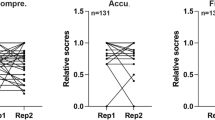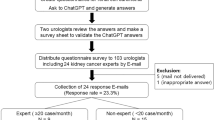Abstract
Chat-GPT, a natural language processing (NLP) tool created by Open-AI, can potentially be used as a quick source for obtaining information related to prostate cancer. This study aims to analyze the quality and appropriateness of Chat-GPT’s responses to inquiries related to prostate cancer compared to those of the European Urology Association’s (EAU) 2023 prostate cancer guidelines. Overall, 195 questions were prepared according to the recommendations gathered in the prostate cancer section of the EAU 2023 Guideline. All questions were systematically presented to Chat-GPT’s August 3 Version, and two expert urologists independently assessed and assigned scores ranging from 1 to 4 to each response (1: completely correct, 2: correct but inadequate, 3: a mix of correct and misleading information, and 4: completely incorrect). Sub-analysis per chapter and per grade of recommendation were performed. Overall, 195 recommendations were evaluated. Overall, 50/195 (26%) were completely correct, 51/195 (26%) correct but inadequate, 47/195 (24%) a mix of correct and misleading and 47/195 (24%) incorrect. When looking at different chapters Open AI was particularly accurate in answering questions on follow-up and QoL. Worst performance was recorded for the diagnosis and treatment chapters with respectively 19% and 30% of the answers completely incorrect. When looking at the strength of recommendation, no differences in terms of accuracy were recorded when comparing weak and strong recommendations (p > 0,05). Chat-GPT has a poor accuracy when answering questions on the PCa EAU guidelines recommendations. Future studies should assess its performance after adequate training.
This is a preview of subscription content, access via your institution
Access options
Subscribe to this journal
Receive 4 print issues and online access
$259.00 per year
only $64.75 per issue
Buy this article
- Purchase on Springer Link
- Instant access to full article PDF
Prices may be subject to local taxes which are calculated during checkout
Similar content being viewed by others
Data availability
Data are available upon request.
Material availability
Material are available upon request.
References
Culp MBB, Soerjomataram I, Efstathiou JA, Bray F, Jemal A. Recent global patterns in prostate cancer incidence and mortality rates. Eur Urol. 2020;77:38–52.
Hamdy FC, Donovan JL, Lane JA, Metcalfe C, Davis M, Turner EL, et al. Fifteen-Year outcomes after monitoring, surgery, or radiotherapy for prostate cancer. N Engl J Med. 2023;388:1547–58.
Lombardo R, De Nunzio C. Nomograms in PCa: where do we stand. Prostate Cancer Prostatic Dis. 2023;26:447–8.
Checcucci E, Rosati S, De Cillis S, Vagni M, Giordano N, Piana A, et al. Artificial intelligence for target prostate biopsy outcomes prediction the potential application of fuzzy logic. Prostate Cancer Prostatic Dis. 2022;25:359–62.
Ditonno F, Franco A, Manfredi C, Veccia A, Valerio M, Bukavina L, et al. Novel non-MRI imaging techniques for primary diagnosis of prostate cancer: micro-ultrasound, contrast-enhanced ultrasound, elastography, multiparametric ultrasound, and PSMA PET/CT. Prostate Cancer Prostatic Dis. 2023. https://doi.org/10.1038/s41391-023-00708-9. Epub ahead of print.
Eppler M, Ganjavi C, Ramacciotti LS, Piazza P, Rodler S, Checcucci E, et al. Awareness and use of ChatGPT and large language models: a prospective cross-sectional global survey in urology. Eur Urol. 2023. https://linkinghub.elsevier.com/retrieve/pii/S0302283823032116
Cocci A, Pezzoli M, Lo Re M, Russo GI, Asmundo MG, Fode M, et al. Quality of information and appropriateness of ChatGPT outputs for urology patients. Prostate Cancer Prostatic Dis. 2023. https://doi.org/10.1038/s41391-023-00754-3. Epub ahead of print.
Lim DYZ, Tan YB, Koh JTE, Tung JYM, Sng GGR, Tan DMY, et al. ChatGPT on guidelines: providing contextual knowledge to GPT allows it to provide advice on appropriate colonoscopy intervals. J Gastroenterol Hepatol. 2023. https://doi.org/10.1111/jgh.16375. Epub ahead of print.
Adhikari K, Naik N, Hameed BZ, Raghunath SK, Somani BK. Exploring the ethical, legal, and social implications of ChatGPT in urology. Curr Urol Rep. 2024;25:1–8.
Daungsupawong H, Wiwanitkit V. Social determinants of health into evaluations of quality and appropriateness of AI assistant ChatGPT. Prostate Cancer Prostatic Dis. 2023. https://doi.org/10.1038/s41391-023-00735-6. Epub ahead of print.
Lombardo R, Cicione A, Santoro G, De Nunzio C. ChatGPT in prostate cancer: myth or reality? Prostate Cancer Prostatic Dis. 2023. Available from: https://www.nature.com/articles/s41391-023-00750-7
Morozov A, Taratkin M, Bazarkin A, Rivas JG, Puliatti S, Checcucci E, et al. A systematic review and meta-analysis of artificial intelligence diagnostic accuracy in prostate cancer histology identification and grading. Prostate Cancer Prostatic Dis. 2023;26:681–92.
EAU-EANM-ESTRO-ESUR-ISUP-SIOG-Guidelines-on-Prostate-Cancer-2023. EAU Guidelines. Edn. presented at the EAU Annual Congress Milan 2023.
Cakir H, Caglar U, Yildiz O, Meric A, Ayranci A, Ozgor F. Evaluating the performance of ChatGPT in answering questions related to urolithiasis. Int Urol Nephrol. 2023;56:17–21.
Baydoun A, Jia AY, Zaorsky NG, Kashani R, Rao S, Shoag JE, et al. Artificial intelligence applications in prostate cancer. Prostate Cancer Prostatic Dis. 2023. https://doi.org/10.1038/s41391-023-00684-0. In Press.
Di H, Wen Y. Will generalist medical artificial intelligence be the future path for health-related natural language processing models? Prostate Cancer Prostatic Dis. 2023. https://doi.org/10.1038/s41391-023-00719-6. In Press.
Drazen JM, Kohane IS, Leong T-Y, Lee P, Bubeck S, Petro J, et al. Benefits, Limits, and Risks of GPT-4 as an AI Chatbot for Medicine. N Eng J Med. 2023. https://doi.org/10.1056/NEJMc2305286. In Press.
Nicoletti R, Nicoletti G, Giannini V, Teoh JYC. Developers-Doctor-patients: the artificial intelligence’s trifecta. Prostate Cancer Prostatic Dis. 2023. https://doi.org/10.1038/s41391-023-00718-7. In Press.
Coskun B, Ocakoglu G, Yetemen M, Kaygisiz O. Can ChatGPT, an artificial intelligence language model, provide accurate and high-quality patient information on prostate cancer? Urology. 2023;180:35–58.
Whiles BB, Bird VG, Canales BK, DiBianco JM, Terry RS. Caution! AI Bot has entered the patient chat: ChatGPT has limitations in providing accurate urologic healthcare advice. Urology. 2023;180:278–84.
Goodman RS, Patrinely JR, Stone CA, Zimmerman E, Donald RR, Chang SS, et al. Accuracy and reliability of chatbot responses to physician questions. JAMA Netw Open. 2023;6:e2336483.
Musheyev D, Pan A, Loeb S, Kabarriti AE. How well do artificial intelligence chatbots respond to the top search queries about urological malignancies? Eur Urol. 2023;85:13–16.
Wang H, Xia Z, Xu Y, Sun J, Wu J. The predictive value of machine learning and nomograms for lymph node metastasis of prostate cancer: a systematic review and meta-analysis. Prostate Cancer Prostatic Dis. 2023;26:602–13.
Manolitsis I, Feretzakis G, Tzelves L, Kalles D, Katsimperis S, Angelopoulos P, et al. Training ChatGPT models in assisting urologists in daily practice. Stud Health Technol Inform. 2023;305:576–9.
Author information
Authors and Affiliations
Contributions
CDN: Protocol/project development, Data collection or management, Data analysis, Manuscript writing/editing. AC: Data collection or management, Manuscript writing/editing. JS: Data collection or management, Data analysis, Manuscript writing/editing. GS: Data collection or management, Manuscript writing/editing. RL Data collection or management, Manuscript writing/editing, Data analysis. SR: Data collection or management, Manuscript writing/editing, Data analysis. MR: Data collection or management, Manuscript writing/editing, Data analysis. BT: Data collection or management, Manuscript writing/editing. GT: Data collection or management, Manuscript writing/editing. YAS: Data collection or management, Manuscript writing/editing. AF: Data collection or management, Manuscript writing/editing. AP: Protocol/project development, Data collection or management, Data analysis, Manuscript writing/editing. GG: Data collection or management, Manuscript writing/editing, Data analysis. AN: Data collection or management, Manuscript writing/editing. AT Protocol/project development, Data collection or management, Data analysis, Manuscript writing/editing. All authors reviewed and approved the final version of the manuscript.
Corresponding author
Ethics declarations
Competing interests
The authors declare no competing interests.
Ethical approval
The study was approved by a local ethical committee and was conducted in accordance with the principles of the Declaration of Helsinki.
Additional information
Publisher’s note Springer Nature remains neutral with regard to jurisdictional claims in published maps and institutional affiliations.
Supplementary information
Rights and permissions
Springer Nature or its licensor (e.g. a society or other partner) holds exclusive rights to this article under a publishing agreement with the author(s) or other rightsholder(s); author self-archiving of the accepted manuscript version of this article is solely governed by the terms of such publishing agreement and applicable law.
About this article
Cite this article
Lombardo, R., Gallo, G., Stira, J. et al. Quality of information and appropriateness of Open AI outputs for prostate cancer. Prostate Cancer Prostatic Dis (2024). https://doi.org/10.1038/s41391-024-00789-0
Received:
Revised:
Accepted:
Published:
DOI: https://doi.org/10.1038/s41391-024-00789-0



